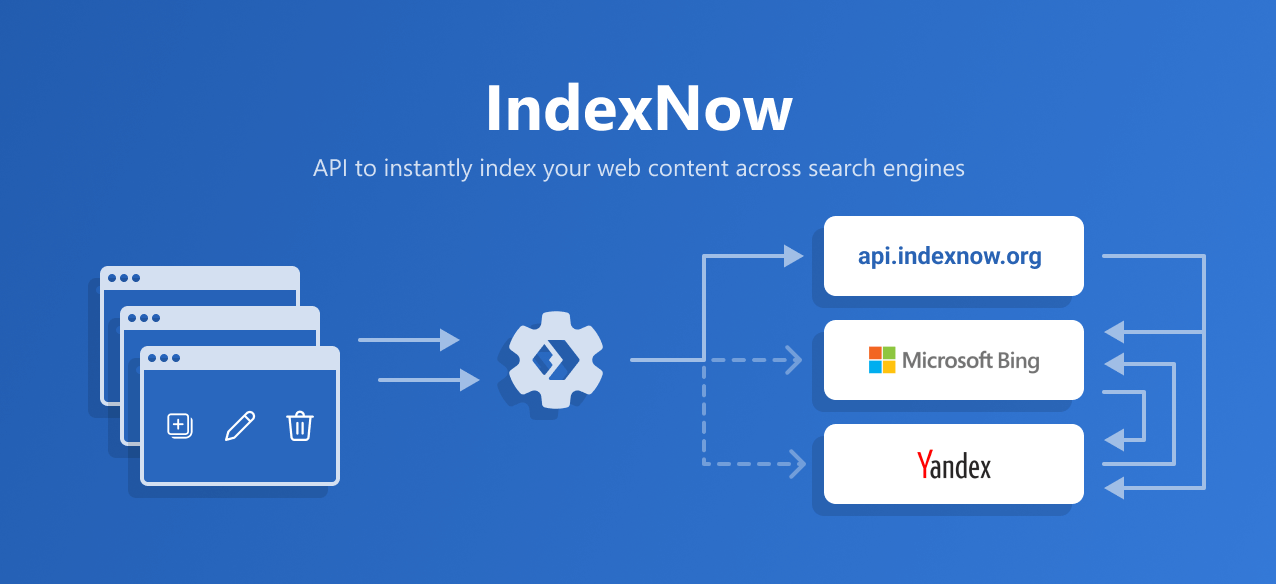

2022-03-10 | 1745 ![]() Print
Print ![]() PDF
PDF
This is a new search engine indexing protocol introduced by Microsoft in October 2021, the concept was to have your content being indexed immediately and have it on other associate search engines which are still just Microsoft Bing and Yandex, are now co-sharing URLs. It is only recently that Google announces its interest in the IndexNow protocol...with IndexNow Google API, we are sure that numerous websites will start to implement this search protocol, but there is a hint that over abusing might result in search engines blocking your website from future indexing.

IndexNow is an easy way for websites owners to instantly inform search engines about the latest content changes on their website. In its simplest form, IndexNow is a simple ping so that search engines know that a URL and its content has been added, updated, or deleted, allowing search engines to quickly reflect this change in their search results...quoted from indexnow.org
Now that we have a concise understanding of what is IndexNow, I think it is fair for us to get to know how IndexNow works. IndexNow is a simple ping protocol so that search engines know that a URL and its content has been added, updated, or deleted, allowing search engines to quickly reflect this change in their search results. The co-sharing of IndexNow went fully live last month in January 2022 between Yandex and Microsoft, other top search engines like DuckDuckGo really don't need to have the protocol as they already utilize the results from Bing with other 400 sources along with their algorithm to produce search results, hence you can rest assured they will automatically pick up the search results if IndexNow correctly to Bing.
Millions of sites using IndexNow. Last November, Cloudflare announced it added integration with IndexNow, and 60,000 websites turned on that feature. Microsoft released a simple to use WordPress plugin for IndexNow and Google announced it would be testing this protocol. Then last month, Microsoft said 80,000 websites are now using IndexNow for URL submission. We are now up to millions of sites adopting IndexNow, just several months after IndexNow was initially rolled out.
There are two different ways search engines obtain index data: Pull and push.
Pull indexing occurs when a search engine visits your site to request web pages and gathers data from the server.
This is how search engines traditionally operate.
Push indexing is when the web publisher or content management system notifies the search engine that pages have been added or deleted or other changes have been made.
That’s what’s truly groundbreaking about the IndexNow – it allows all URLs submitted to any IndexNow-enabled search engine to be simultaneously submitted to all the other search engines using the protocol.
You can read more about the technical aspects of how IndexNow works here.
At the time of publication, Bing and Yandex are using IndexNow.
A handful of others are reportedly testing the protocol, according to an unnamed expert.
So far, DuckDuckGo has not announced any plans to adopt IndexNow.
However, it’s worth noting that the privacy-focused search engine draws from up to 400 sources in addition to using its own DuckDuckBot web crawler in the compilation of its search results.
Given that Bing and Yandex are among those sources, you could see updated content appearing in DuckDuckGo quicker due to IndexNow, as well.
Even Bing’s largest competitor, Google, the foremost of all search engines, has confirmed they will be testing the IndexNow protocol.
And while they haven’t gone so far as announce whether or not they will adopt it, the fact they are experimenting with it shows a recognition of its capabilities.
Google’s top concerns about IndexNow seem to be related to sustainability and efficiency.
Google is currently using HTTP/2, an efficient fundamental data transfer protocol for more than half of all crawls, and may ultimately decide this is a better fit for their needs.
Or they may decide to build their own alternative if they determine an API-based approach is needed – and it’s not a foregone conclusion that they will.
But not everyone is on board.
There are plenty of people in the SEO community who don’t see the need for this protocol, instead claiming XML sitemaps already accomplish what IndexNow is trying to do.
Notifying search engines of updates to your web content using IndexNow is a straightforward process:
For examples and more in-depth instructions, you can visit the IndexNow site.
More advanced users can use Python for bulk indexation and URL submission automation.
This requires a basic understanding of Python syntax and familiarity with Python libraries and packages.
Any website developer can use the process outlined here to take advantage of IndexNow, but what’s really exciting is that you don’t have to know HTML from HDMI to reap the benefits.
A number of large companies, including LinkedIn, MSN, and GitHub are all planning migrations to IndexNow.
Additionally, other search solution providers like Botify, OnCrawl, Onely, and Yext are in the process of adopting this protocol.
Content management systems (CMS) are also jumping on board.
WordPress already offers an IndexNow plugin. Duda supports this proactive approach to web crawling, and Wix plans to integrate soon.
Bing recently announced Rank Math and All In One SEO integration for IndexNow, as well.
Content delivery networks (CDN) supporting IndexNow include Cloudflare and Akamai.
Through their proxy servers, this will speed up data delivery and bring it closer to users.
In addition to emphasizing the evolution of indexing from pull to push, the primary benefit of IndexNow for publishers is the elimination of the time between updates being made and search engines discovering them.
By allowing webmasters to notify all participating URLs with a single API call, search engine content discovery is streamlined, which in turn makes the web more efficient.
This is advantageous to site owners, as growing requirements are reduced on the server.
Search engine spiders no longer have to perform exploratory crawls to determine whether a page has been updated.
This enables servers to work more efficiently without the need for a redundant site load, which in turn reduces energy usage.
And unlike an XML sitemap, which only redirects SEO crawlers to pages within your website, IndexNow allows you to inform search engines of non-200 status code pages.
IndexNow conveys your changes to search engines, which in turn apply them to page rankings.
Using IndexNow doesn’t guarantee web pages will be crawled or index and it may take time for changes to be reflected.
You can provide search engines with a list of up to 10,000 URLs with a single API call.
Yes, the sooner your pages are indexed, the more quickly they can start competing for high-ranking search engine spots.
The march of technology is inexorable.
And as such a vital part of the modern world, it’s only natural that changes to the internet, and in particular search engines, would be part of them.
By shifting the process of indexing sites away from a crawling process to something faster and more efficient, IndexNow seems to be on the cusp of a revolution.
And the fact that companies like MSN, GitHub, and WordPress are all joining in seems to hint that this protocol will soon become the norm.
original author:https://www.searchenginejournal.com/indexnow-what-we-know/439679

I am a seo web analyst and have a love for anything online marketing. Have been able to perform researches using the built up internet marketing tool; seo web analyst as a case study and will be using the web marketing tool (platform).
How To Fix GA4 Showing Wrong Domain Traffic
How To Reactivate Google Adsense Account
How Do You Write Pitch Deck That Wins Investors
Effective Lead Magnet Funnel Examples For Businesses
How To Promote FMCG Products Using Digital Marketing
The Main Objectives Of SEO in Digital Marketing
How Artificial Intelligence Is Transforming Digital Marketing
Google CEO Sundar Pichai: Search will profoundly change in 2025
3 Most Important Business Growth Strategies
Top 20 Work From Home Job Skills